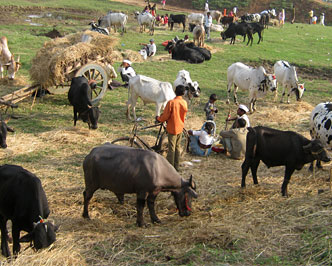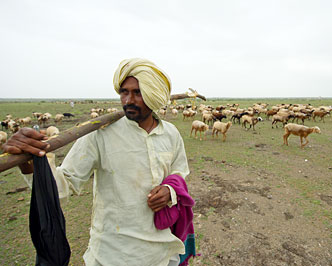-
- May 22, 2025
No Pastoralist Woman Left Behind: 2026
Newsletter Logo
IYRP Dispatch
502 subscribersSubscribed
No Pastoralist Woman Left Behind: 2026 Must Deliver on Rights, Resources, and Recognition
May 19, 2025
By Maria Fernandez-Gimenez and Nitya GhotgeThe United Nations has designated 2026 as the International Year of Rangelands and Pastoralists (#IYRP2026) and the International Year of the Woman Farmer (#IYWF2026). This provides a double opportunity to spotlight the importance of women in pastoralism.
Women play essential roles in pastoralism, providing knowledge, labour, and ingenuity, and contributing to community resilience in the face of varied global changes. Pastoralist women care for livestock, families, and natural resources; maintain social cohesion within families, communities, and with other land users; and preserve and pass down traditional knowledge. Pastoralist women lead social and economic innovation. They also face challenges. Often, pastoralist women lack the same access to land, livestock, technical and financial services, and participation in decision-making processes that men in their communities enjoy. Inadequate education, health, and social services adapted for mobile people may hinder pastoralist women’s well-being and opportunities.The IYRP and the IYWF offer a chance to celebrate and support pastoralist women’s initiatives and to strengthen their voices in advocacy at national and international levels in ways that build on their own plans and ideas. Pastoralist women worldwide are forming networks, advocating for land-use rights, and creating new enterprises and activities related to dairying, animal fibre production,and human and animal healthcare, to name a few.
Over 100 pastoralist women from around the world gathered in 2010, creating the Mera Declaration, a series of calls to action supporting pastoralist women and extensive livestock production.
Among these calls to action are:
Recognize pastoralist women’s rights and their contributions to biodiversity and climate resilience
Implement gender-responsive policies for land use and governance
Provide accessible education and health services tailored to mobile pastoralists
Support pastoralist women’s leadership and networking
Integrate women’s perspectives into all development interventions related to pastoralism to ensure equity and sustainability.With the support of the IYRP Gender and Women Working Group, a follow-on Mera +16 global gathering is planned for spring 2026. The Working Group consists of representatives from civil society, research, and government organizations around the world and includes pastoralist women, academics, conservation and development practitioners, artists, and activists.
The Working Group supports pastoralist women and their women-led networks and initiatives. We highlight the roles and situations of pastoralist women globally and support pastoralist women-led efforts to increase their recognition, status, and influence. To do this, we produce policy papers and briefs (https://www.iyrp.info/working-groups), curate and screen films on pastoralist women and girls, participate in international meetings and events, and are working to organise the Mera+16 global gathering of pastoralist women in spring 2026.

- About Us
- Focus Areas
- Projects

- Overview
Active Projects
- Gender and Livestock in India: Toolkit for Evolving Research Strategies
- Livestock in Agroecology: an action research project to document and share different ways livestock contribute to promote agroecology
- IndiaZooRisk+: Using OneHealth approaches to understand and co-develop interventions for zoonotic diseases affecting forest communities in India
- Bringing Visibility and Recognition to Women Livestock Farmers and Pastoralists & Their Knowledge
Completed Projects
- Mapping Rangelands and Pastoral Landscapes
- Livestock Products and Livestock Markets in Dryland Areas of India: Emerging Changes and Challenges
- Mobile And Solar
- Maternal And Child Health In Mobile Pastoral Communities: Invisible And Unaccounted For
- Reduction Of Antibiotic Use In Dairy Farming
- Milk Produced Under Different Systems In India
- Enabling access to ‘good food’ through a rural-urban exchange
- Partnering through Knowledge Sharing: Helping Small Livestock holding Communities emerge from the Shadows
- School Under a Thousand Stars
- Publications
- Blog



